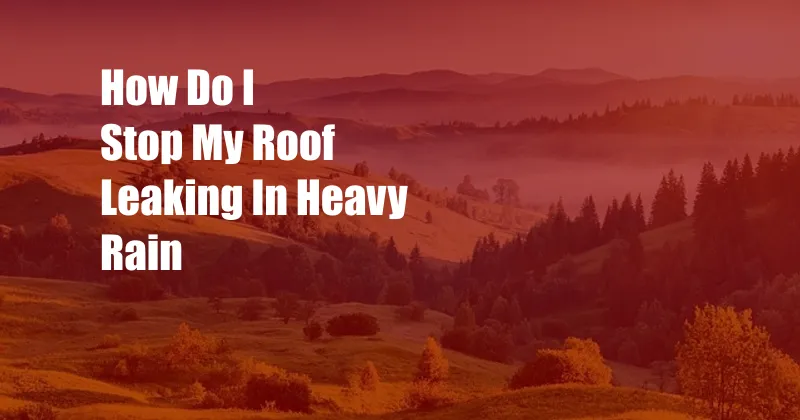
<h2>How to Stop Your Roof Leaking in Heavy Rain: A Comprehensive Guide</h2>
<p>Heavy rain can be a nightmare for homeowners, especially if your roof is not adequately prepared. A leaky roof can cause extensive damage to your home's interior, leading to costly repairs and even health hazards.</p>
<p>If you're experiencing roof leaks during heavy downpours, don't panic. With the right approach, you can effectively stop the leaks and prevent further damage. This comprehensive guide will provide you with a step-by-step process on how to identify and repair roof leaks, ensuring your home stays dry and protected.</p>
<h3>Identifying the Source of the Leak</h3>
<p>The first step towards stopping a roof leak is to locate the source. This can be challenging, especially if the leak is not directly below the entry point.</p>
<p>To identify the source of the leak, carefully inspect your roof for any visible signs of damage, such as missing or damaged shingles, cracks in the flashing, or holes in the roof membrane. Using a flashlight during the inspection can help illuminate potential problems.</p>
<h3>Temporary Leak Repair Techniques</h3>
<p>Once you've located the source of the leak, it's crucial to implement temporary repair measures to prevent further water damage. Here are some effective temporary repair techniques:</p>
<ul>
<li><strong>Cover the Leak with a Tarp:</strong> If possible, cover the leak with a waterproof tarp to prevent rainwater from entering the house. Secure the tarp with weights or bungee cords.</li>
<li><strong>Apply a Sealant:</strong> If the leak is small, you can apply a sealant like caulk or roofing cement to the affected area. Let it dry completely before testing its effectiveness.</li>
<li><strong>Use a Wet-Vac:</strong> Remove excess water from the affected area using a wet vacuum cleaner. This will help prevent further damage caused by stagnant water.</li>
</ul>
<h3>Permanent Leak Repair Solutions</h3>
<p>While temporary repairs can provide immediate relief, they are not a long-term solution. For lasting protection, it's essential to implement permanent leak repair solutions based on the identified source of the leak.</p>
<p>For damaged shingles, replace the affected shingles with new ones. Ensure the shingles are properly aligned and nailed down. If the flashing around chimneys, vents, or skylights is damaged or loose, replace or repair it to prevent water seepage.</p>
<h3>Professional Roof Inspection and Repairs</h3>
<p>If the roof leak is extensive or you're not comfortable performing the repairs yourself, it's advisable to contact a qualified roofing professional. A professional roofer can inspect your roof, identify the source of the leak, and recommend the most appropriate repair solution.</p>
<p>Professional roofers have the expertise and experience to address complex roof leaks effectively. They can also provide valuable advice on long-term roof maintenance and prevention strategies to minimize future leaks.</p>
<h3>Tips and Expert Advice on Roof Leak Prevention</h3>
<p>Preventing roof leaks is crucial to maintain a dry and damage-free home. Here are some expert tips to help prevent roof leaks:</p>
<ul>
<li><strong>Regular Roof Inspections:</strong> Regularly inspect your roof, especially after major storms or strong winds, to identify and address any potential issues early on.</li>
<li><strong>Clean Your Gutters:</strong> Keep your gutters and downspouts clean to ensure proper water drainage. Clogged gutters can cause water to back up and seep into the roof.</li>
<li><strong>Trim Overhanging Branches:</strong> Trim tree branches that overhang your roof to prevent them from rubbing against the roofing material and causing damage.</li>
<li><strong>Apply Roof Sealant:</strong> Periodically apply a roof sealant to the roof surface to fill in any small gaps or cracks and enhance water resistance.</li>
</ul>
<p>By following these tips, you can significantly reduce the risk of roof leaks and protect your home from water damage.</p>
<h3>FAQs on Roof Leaks</h3>
**Q: What are the signs of a roof leak?**
<p>A: Signs of a roof leak include water stains on ceilings or walls, peeling paint, mold growth, and visible holes or cracks in the roof.</p>
**Q: Can I fix a roof leak myself?**
<p>A: Small roof leaks can be repaired temporarily using a sealant or caulk. However, for more extensive or complex leaks, it's recommended to seek professional help from a qualified roofer.</p>
**Q: How can I prevent roof leaks in the future?**
<p>A: Regular roof inspections, gutter cleaning, and applying a roof sealant can help prevent roof leaks. Additionally, trimming overhanging branches and addressing any potential roof damage promptly can minimize the risk of leaks.</p>
<h3>Conclusion</h3>
Roof leaks can be a major inconvenience and can cause significant damage to your home if not addressed promptly. By following the steps outlined in this guide and implementing the tips and advice provided, you can effectively stop roof leaks during heavy rain and maintain a dry and protected home.
Remember, if you encounter any complex or extensive roof leaks, don't hesitate to contact a qualified roofing professional for expert advice and repairs. Your proactive approach to roof leak prevention and repair will ensure your peace of mind and the longevity of your home.
<strong>Are you interested in learning more about roof leak prevention and repair techniques? Let us know in the comments below!</strong>
